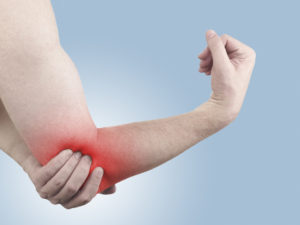The tendons are the connective tissue that joins muscles in the body to bones. They help to facilitate movement, and many people never give their tendons a second thought. However, it is possible for the tendons to become inflamed, which is known as tendinitis. This condition causes pain, and it can make it hard to move the joint, which severely limits a person’s ability to move freely the way they did before. While all joints could suffer from the condition, some are more prone to tendinitis than others are, namely the elbow and the wrist. Here’s some more information on how to treat tendinitis.
Common Causes of Tendinitis
Many times, tendinitis is the result of repetitive actions. This causes the tendons to be used too much, and some people develop tendinitis as a result. It can occur because of actions from sports, as well as different types of actions performed at work or at home. It is also possible to suffer from tendinitis due to an injury, as well as aging. As people get older, their body begins to break down, and the tendons can be some of the first parts to have trouble. Those who have certain conditions, such as rheumatoid arthritis or diabetes, can also be afflicted with tendinitis.
What Are the Symptoms?
When someone has tendinitis, they generally complain of an aching feeling around the joint. The pain will increase when they try to move the joint, and it can even cause pain if someone bumps or touches the joint. In some cases, particularly after trying to use the afflicted joint, people will also notice some swelling.

Getting a Diagnosis
When some people feel the onset of tendinitis, they do not realize what it is. They may believe that they are just tired and sore from doing too much, and hope that rest will alleviate the problem. While rest may be able to help, it is always a good idea to speak with a doctor, such as Michigan-based hand surgeon Dr. Avery Arora. A specialized doctor can look at your medical history and examine the joint to determine the problem. Part of the exam will be to test your range of motion. They will want to know what types of activities you do as well, as this can give them a clue as to the nature of the injury. They may also order imaging tests.
Treatment Options
In the cases where tendinitis is relatively mild, there are some simple treatments your doctor can try. They will want you to rest, and they may advise you to use cold or heat on the affected area. They may also recommend taking pain relievers and anti-inflammatory drugs. In addition, they could provide you with exercises you can do to strengthen the area.
In some cases, the doctor may also recommend surgery. They are able to remove the inflamed tissue, which can help to reduce the amount of pain the patient feels, and this can provide them with more mobility and range of motion. Each patient is different, and you will want to talk with your doctor about the best options to try when treating your tendinitis.
Here at Arora Hand Surgery, we care about your health. If you are feeling hand, wrist, or elbow discomfort, visit Dr. Avery Arora at one of his southeast Michigan offices located in West Bloomfield, Warren, Macomb Township, or Howell.













